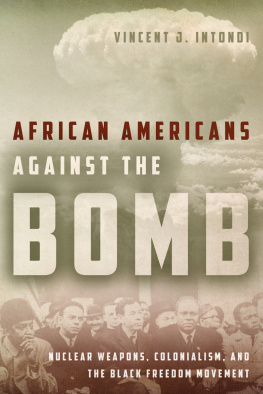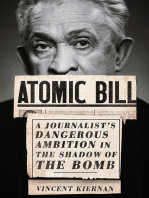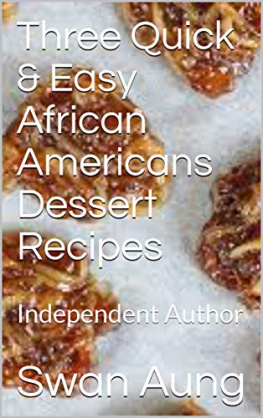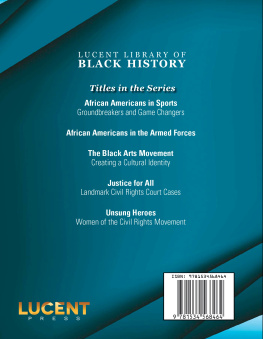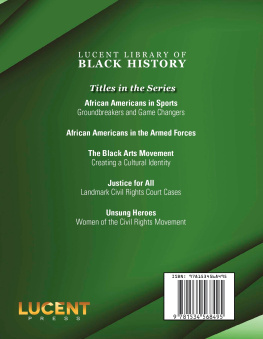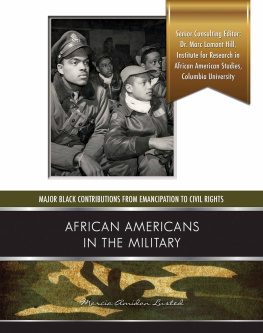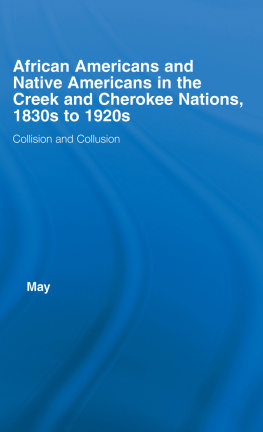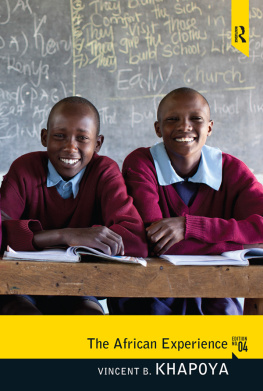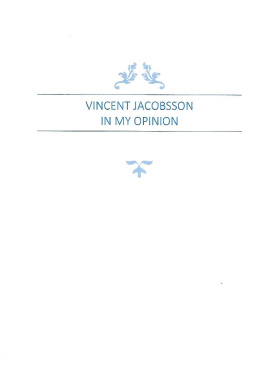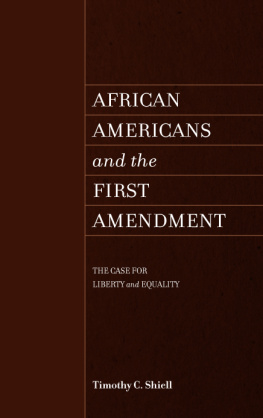Stanford University Press
Stanford, California
2015 by the Board of Trustees of the Leland Stanford Junior University. All rights reserved.
No part of this book may be reproduced or transmitted in any form or by any means, electronic or mechanical, including photocopying and recording, or in any information storage or retrieval system without the prior written permission of Stanford University Press.
Printed in the United States of America on acid-free, archival-quality paper
Library of Congress Cataloging-in-Publication Data
Intondi, Vincent J., author.
African Americans against the bomb : nuclear weapons, colonialism, and the Black freedom movement / Vincent J. Intondi.
pages cm. (Stanford nuclear age series)
Includes bibliographical references and index.
ISBN 978-0-8047-8942-4 (cloth : alk. paper)ISBN 978-0-8047-9275-2 (pbk. : alk. paper)
1. African American political activistsHistory20th century. 2. African AmericansPolitics and government20th century. 3. Antinuclear movementUnited StatesHistory20th century. 4. Civil rights movementsUnited StatesHistory20th century. 5. Anti-imperialist movementsUnited StatesHistory20th century. 6. United StatesPolitics and government1945-1989. I. Title. II. Series: Stanford nuclear age series.
E185.61.I64 2014
323.1196'0730904dc23
2014031670
ISBN 978-0-8047-9348-3 (electronic)
Designed by Bruce Lundquist
Typeset by Classic Typography in 10.25/15 Brill
Acknowledgments
IN THE SUMMER OF 2005, I MADE MY FIRST TRIP TO HIROSHIMA as part of American Universitys Nuclear Studies Institute. Up to that point, my research had focused primarily on African American history. However, I was not prepared for the impact the atomic bomb survivors would have on my life. Hearing the testimony of Koko Kondo and witnessing firsthand what my country had done, I returned determined to continue studying the effects of nuclear weapons. Soon after, I met with Peter Kuznick, director of the Nuclear Studies Institute, and explained my desire to now focus on both African American history and the bomb. Peter asked one question: What did African Americans think of Trumans decision? It was finding the answer to that question which ultimately led to this book.
This entire journey began at SUNY Oswego, a small state school in upstate New York whose history department remains a hidden gem. Attending SUNY Oswego, I was fortunate to have the support and guidance of Gerry Forbes, Judith Wellman, and David Conrad. I am deeply thankful to David. Even as the years passed, while I was in Washington and he in Africa, Davids words of encouragement always reached my inbox at the right moments. He was one of the first scholars to put me on this path, and I truly appreciate all he has done to make this possible.
American Universitys history department is what ultimately brought me to the nations capital. Beyond that department, I would also like to acknowledge American Universitys College of Arts and Sciences for providing the fellowships and support that provided much-needed sustenance throughout this process. Eileen Findlay and Alan Kraut deserve special thanks for extending my thinking and for their expansive scholarship, generous natures, and insightful advice. They are not just brilliant scholars. They are great people.
Librarians and archivists at many institutions assisted my research efforts. Thank you to Wendy Chmielewski and the staff at the Swarthmore College Peace Collection, and to Clement Ho at American University, for your constant assistance and expertise.
Many scholars and individuals have publicly supported my work and believed this book should be published. Tom Hayden, Daniel Ellsberg, Oliver Stone, Gerald Horne, and Derek Turner have all helped in their own way to get this book out, and I am truly thankful. Martin Sherwin and Carol Anderson are two scholars who also deserve special thanks and praise. Marty and Carol supported my work from the beginning, made it known, and were willing to fight to make this book a reality. Their scholarship helped make this book stronger. Their passion for my work helped get it published.
I would also like to thank Lisa Stokes, Danny Gilmartin, Marilyn Wells, and Bobby Bell at Seminole State College. Being able to walk down the hall every day, pop into Dannys office, and discuss my work, with John Coltrane playing in the background, meant more to me than he will ever know. In addition, I am thankful for my current home, Montgomery College. Teaching at a school where you cannot wait to arrive each morning, receive constant support from colleagues and staff, and have the opportunity to teach some of the most amazing students in the world made all the difference throughout this process.
Were it not for my close friends, who always knew when to make me laugh, when to offer words of encouragement, and who constantly reminded me to keep my eye on the prize, this book may not have been completed. A special thanks to Eric Singer, Paul Detor, Chris Ruding, Liam and Shannon Delaney, John and Laurie Chappell, Robert Williams, and Daniel Persons.
Fellow historian David Ekbladh deserves a special mention. Even with two little ones at home and with his own research work, no matter when the phone rang or e-mail arrived David never hesitated to offer guidance. His knowledge of the craft makes him a treasure, not only for Tufts but for the entire academy. He is a dear friend to whom I am deeply thankful.
Peter Kuznick was the foremost reason I chose to study at American University. Peter has taught me more about the profession and writing than any other individual. While I am enormously grateful for Peters unwavering belief in me as a scholar and activist, it is his constant example of a professional, dedicated historian who fights for change that I most appreciate. His commitment to students, scholarship, and to ensuring the world is free of nuclear weapons is truly inspiring. I will never be able to thank Peter enough for his continued passion for my workeven when The Untold History of the United States avalanche hit.
It is unlikely that this book would have been published without my family. I am grateful for all the Skype sessions with my cousin John Pitonzo in Florence. Johns expertise in Shakespeare undoubtedly made this book stronger as he edited my work. Special thanks to my sister, niece, brother-in-law, and grandparents who all reminded me throughout the years what is truly important and never doubted this day would arrive.
Most especially, I would like to thank my parents, the two most important people in my life. I cannot begin to describe their patience, compassion, love, and willingness to sacrifice so that I could complete this book. I am eternally grateful and proud to call them Mom and Dad.
Besides my parents, no single person deserves more credit for making this book happen than my wife, Natalie. I honestly cannot put into words my gratitude for her willingness, since we first met, to sacrifice as I wrote, edited, rewrote, and reedited. Her smile, laugh, strength, and courage are what got me to this point. Every day I am awed by her good nature, huge heart, and love for humanity. For me the sun rises and sets with her, which is why it is to her that this book is dedicated.


